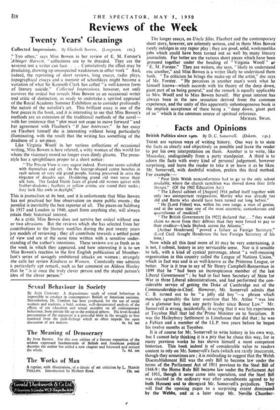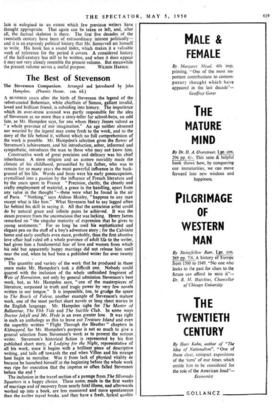Facts and Opinions
British Politics since 19oo. By D. C. Somervell. (bakers. r ss.) THERE are various ways of writing history. One way is to state the facts as clearly and objectively as possible and leave the reader to put his own interpretation on them. Another is to write, like Macaulay, undisguisedly from a party standpoint. A third is to adorn the facts with every kind of personal judgement, however surprising, and leave the reader to take it or leave it as he likes. Mr. Somervell, with doubtful wisdom, prefers this third method. For example:— " Poor little Welsh nonconformists had to go to the only school available, where the church catechism was shoved down their little throats." (Of the 1902 Education Act.) " The Liberal cabinet of [August] 1914 pulled itself together with only two unimportant resignations, Morley who was already too old and Burns who should have been turned out long before."
" He [Lord Fisher] was, within his own range, a man of genius, and at the same time one of the most eccentric, cantankerous and quarrelsome of mankind."
"The British Government [in 1922] declared that . . !they would claim no more from their debtors than they were forced to pay to their creditor—Uncle Shylock across the Atlantic."
[Arthur Henderson] proved a failure as Foreign Secretary." (Lord Cecil thought Henderson the best Foreign Secretary of his time.)
Now while all this (and more of it) may be very entertaining, it is not, I submit, history in any serviceable sense. Nor is it sensible to talk, with a kind of cynical patronage, about " a well-meaning organisation in this country called the League of Nations Union," which in fact was and is as well-known as the Primrose League, or better. Nor is it true to say of Sir Henry Campbell-Bannerman in 1899 that he " had been an inconspicuous member of the last Liberal Government " ; he had in fact been Secretary of State for War in three Liberal administrations, and had performed the con- siderable service of getting the Duke of Cambridge out of the Commandership-in-Chief. However, Mr. Somervell admits that C. B. turned out to be " a jolly old boy "—a phrase which matches agreeably the later assertion that Mr. Attlee " was less of a glamour boy than any party leader since Bonar Law." Mr. Somervell is wrong, incidentally', in saying that it was his experiences at Toynbee Hall that led ..the Prime Minister on to Socialism. It was the Haileybury Settlement in Limehouse that did that he was a Fabian and a member of the I.L.P. two years before he began his twelve months at Toynbee.
It is of course for Mr. Somervell to write history in his own way, but I cannot help thinking it is a pity that he chose this way, for in many previous works he has shown himself a most competent historian. This book indeed is of considerable value to readers content to rely on Mr. Somervell's facts (which are rarely inaccurate, though they sometimes are ; it is misleading to suggest that the Welsh Disestablishment Bill was the only Bill to become law under the terms of the Parliament Act of 1911 previous to the Steel Bill of 1948-9 ; the Home Rule Bill became law under the Parliament Act of 1911, though it never came into operation, and the Steel Bill was enacted in the ordinary way after amendments agreed to by both Houses) and to disregard Mr. Somervell's prejudices. They will find the opening pages to a surprising extent dominated by the Webbs, and at a later stage Mr. Neville chamber-
lain is eulogised to an extent which few previous writers have thought appropriate. That again can be taken or left, and, after all, the factual skeleton is there. The first five decades of the twentieth century have been of extraordinary interest politically— and it is an expressly political history that Mr. Somervell set himself to write. His book has a sound index, which makes it a valuable work of reference for the period it covers. A considered history of the half-century has still to be written, and when it does appear it may not very closely resemble the present volume. But meanwhile
the present volume serves a useful purpose. WILSON HARRIS.







































 Previous page
Previous page